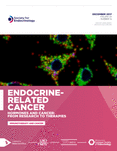Fighting tubulin-targeting anticancer drug toxicity and resistance
- 1Institute for the Experimental Endocrinology and Oncology ‘G. Salvatore’, Italian National Council of Research, Napoli, Italy
- 2Ceinge-Biotecnologie Avanzate, Napoli, Italy
- 3Department of Molecular Medicine and Medical Biotechnologies, University of Napoli ‘Federico II’, Napoli, Italy
- Correspondence should be addressed to R Visconti or D Grieco; Email: r.visconti{at}ieos.cnr.it or domenico.grieco{at}unina.it
Abstract
Tubulin-targeting drugs, like taxanes and vinca alkaloids, are among the most effective anticancer therapeutics used in the clinic today. Specifically, anti-microtubule cancer drugs (AMCDs) have proven to be effective in the treatment of castration-resistant prostate cancer and triple-negative breast cancer. AMCDs, however, have limiting toxicities that include neutropenia and neurotoxicity, and, in addition, tumor cells can become resistant to the drugs after long-term use. Co-targeting mitotic progression/slippage with inhibition of the protein kinases WEE1 and MYT1 that regulate CDK1 kinase activity may improve AMCD efficacy, reducing the acquisition of resistance by the tumor and side effects from the drug and/or its vehicle. Other possible treatments that improve outcomes in the clinic for these two drug-resistant cancers, including new formulations of the AMCDs and pursuing different molecular targets, will be discussed.
- taxane
- vinca alkaloids
- castration-resistant prostate cancer
- triple-negative breast cancer
- mitosis
- spindle assembly checkpoint
- WEE1 inhibitor
- MYT1
- Received 9 June 2017
- Accepted 10 July 2017
- © 2017 Society for Endocrinology












